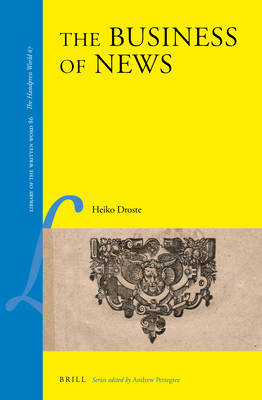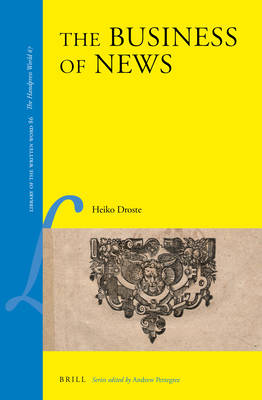
Je cadeautjes zeker op tijd in huis hebben voor de feestdagen? Kom langs in onze winkels en vind het perfecte geschenk!
- Afhalen na 1 uur in een winkel met voorraad
- Gratis thuislevering in België vanaf € 30
- Ruim aanbod met 7 miljoen producten
Je cadeautjes zeker op tijd in huis hebben voor de feestdagen? Kom langs in onze winkels en vind het perfecte geschenk!
- Afhalen na 1 uur in een winkel met voorraad
- Gratis thuislevering in België vanaf € 30
- Ruim aanbod met 7 miljoen producten
Zoeken
€ 291,95
+ 583 punten
Omschrijving
In the seventeenth century news was an investment in social relationships, a resource that concerned the interests of members of functional elites. Exchanging news entailed different forms of participation in functional elites and, thus, privilege. This business was part of the elites' internal social structures; it constituted the fabric of all public institutions.
This book questions notions of a print-based public sphere in the seventeenth century. It is based on contemporary tracts on newspapers, the court culture, and letter-writers, as well as news correspondences and other material from archives in the Baltic Sea Region and beyond.
This book is a translation of: Das Geschäft mit Nachrichten: Ein barocker Markt für soziale Ressourcen (Bremen: edition lumière, 2018).
This book questions notions of a print-based public sphere in the seventeenth century. It is based on contemporary tracts on newspapers, the court culture, and letter-writers, as well as news correspondences and other material from archives in the Baltic Sea Region and beyond.
This book is a translation of: Das Geschäft mit Nachrichten: Ein barocker Markt für soziale Ressourcen (Bremen: edition lumière, 2018).
Specificaties
Betrokkenen
- Auteur(s):
- Uitgeverij:
Inhoud
- Aantal bladzijden:
- 344
- Taal:
- Engels
- Reeks:
- Reeksnummer:
- nr. 86
Eigenschappen
- Productcode (EAN):
- 9789004415850
- Verschijningsdatum:
- 23/06/2021
- Uitvoering:
- Hardcover
- Formaat:
- Genaaid
- Afmetingen:
- 155 mm x 235 mm
- Gewicht:
- 689 g

Alleen bij Standaard Boekhandel
+ 583 punten op je klantenkaart van Standaard Boekhandel
Beoordelingen
We publiceren alleen reviews die voldoen aan de voorwaarden voor reviews. Bekijk onze voorwaarden voor reviews.









